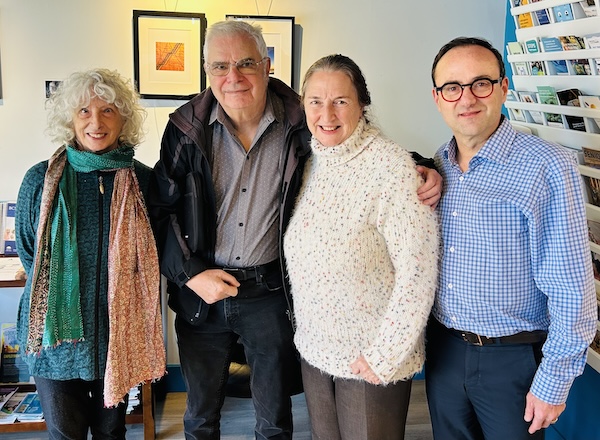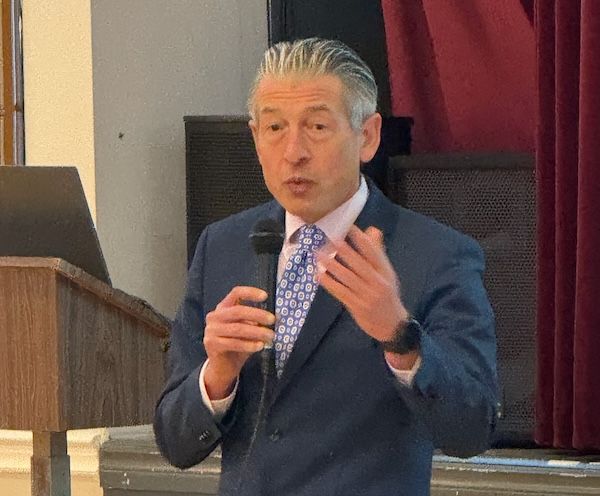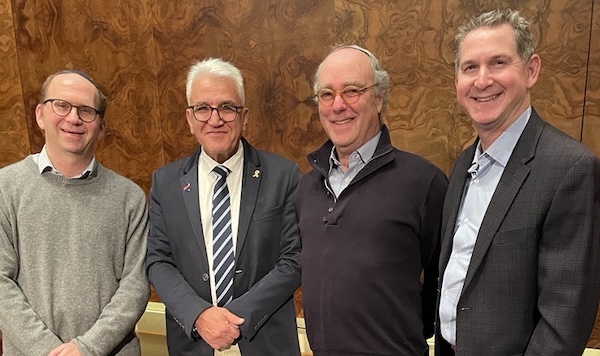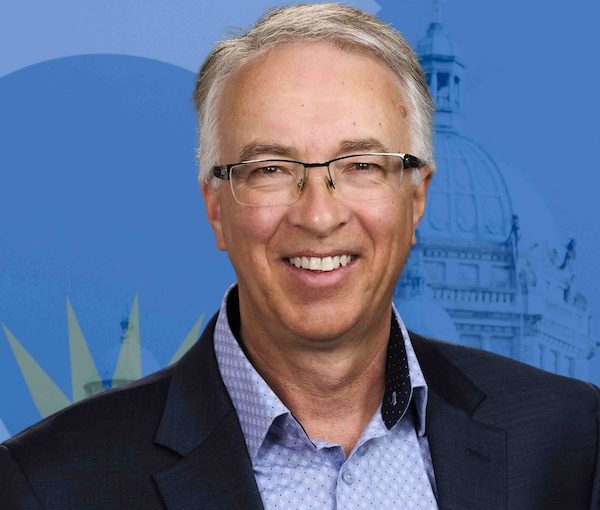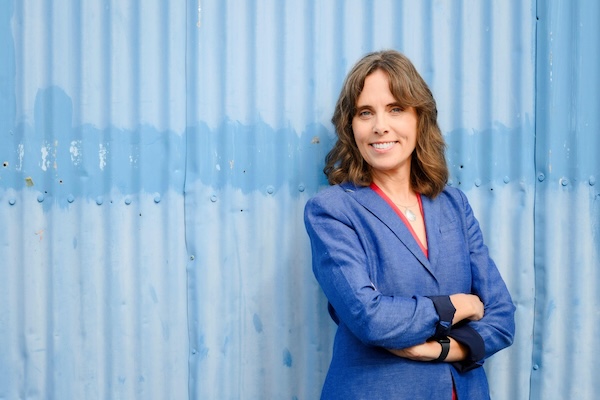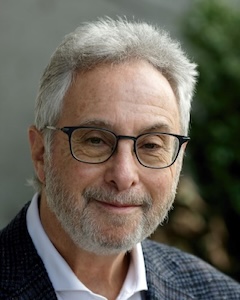Jewish Seniors Alliance of British Columbia’s Margot Beauchamp, left, and Jeff Moss, right, with advocate for seniors’ rights Howard Glick and Parliamentary Secretary for Seniors’ Care and Long-Term Care Susie Chant. (photo from JSA)
Jewish Seniors Alliance, whose mission is to reduce isolation, build connection and uplift and support Jewish and other seniors in the province, started 2025 with a new name.
At its annual general meeting last November, the organization chose to rename itself the Jewish Seniors Alliance of British Columbia. Formerly, it was called the Jewish Seniors Alliance of Greater Vancouver. One of the motivations for the change was to better reflect the organization’s goals and the services it provides.
The new name comes as JSA expands its advocacy work throughout the province, with efforts such as extending its reach, via its Senior Line magazine, to more communities. The new name, it maintains, recognizes the need to connect with more seniors in the province. Initially, JSA intends to partner with outreach programs in the Sea-to-Sky, Burquitlam and Surrey regions.
Similarly, the JSA Peer Support Services program has been rebranded. It will now be known as Community Support Services (CSS), which the organization believes will express its objectives and more clearly define the services it offers with senior volunteers and clients: senior peer support and friendly visiting/calling.
Concurrently, JSA has relaunched its advocacy work around free home support for all BC seniors, stating that it had success with this effort in the run-up to the provincial election. It will continue to meet with government and opposition MLAs, as well as work with and through community partners to ask people to contact their MLAs to voice their support for the initiative.
“The JSA approach to advocacy and government relations has been focused and targeted on decision-makers,” said JSA executive director Jeff Moss during a Jan. 22 Zoom event, in which he discussed the proposal for universal home care in British Columbia as a way to reduce the burden on individuals and government spending.
Moss summarized a recent mandate letter to Susie Chant, parliamentary secretary for seniors’ care and long-term care, which advocated for increased health-care availability, cost containment, responsive health systems, increased senior care, engagement with stakeholders and communication with the health ministry.
Howard Glick, an advocate for seniors’ rights and barrier-free healthcare, joined Moss on the Zoom panel. Glick had recently produced a short video, The Home Care Imperative: A Humanitarian Solution, on the need for free home support in the province, which was shown to the audience.
The video emphasized the advantages of home care, including aging in place, which can allow seniors to preserve their independence and dignity. It can also produce systemic savings that reduce waits for long-term care and free up hospital beds. And its implementation can be expedited, as home care can be scaled more quickly than construction for long-term care facilities.
Also stressed in the video was the idea of accessible, personalized home care as a better way to benefit seniors in their daily lives. The video argued that such a measure would foster independence and connection while strengthening the health-care system overall. This issue is particularly pressing, as the number of seniors in the province, and across the country, is set to increase in the coming two decades.
Most older adults, the video pointed out, would prefer to stay at home. Research from the Office of the Seniors Advocate, under the leadership of both former seniors advocate Isobel MacKenzie (now a JSA board member) and current advocate Dan Levitt, shows that many admissions to long-term care could have been treated at home with the right supports. Women, people in rural communities and those living alone make up a greater percentage of those moving into long-term care, according to the office’s report.
According to the video, British Columbia, when compared to Ontario, is lacking in several features that pertain to senior care, such as funding, services, eligibility, caregiver support and integration. The costs associated with accessing care for seniors in British Columbia greatly exceed those of other provinces as well, the video contends, noting that Alberta, Ontario and other provinces offer free home support for older adults.
Following the video, Moss reviewed a long list of advantages of providing free home care.
“The benefits are personalized at-home care, ease of access, reduced hospitalizations, fewer unnecessary admissions to long-term care, better health outcomes, increased independence and peace of mind,” he said.
During the question-and-answer session, it was conceded that the home-care model proposed in the video is, at present, far from the current reality.
“At this point, the system is fragmented, disorganized and unreliable, and there are a whole bunch of other problems. What our video is advocating is how to make things work for people in the future and that means reevaluating the structure of the system completely,” Glick said.
“Before any changes can be made, we have to have influence and contacts, we don’t have that yet. We’re just in the starting process of trying to get our foot in the door with the people who have the money and make policy,” he added.
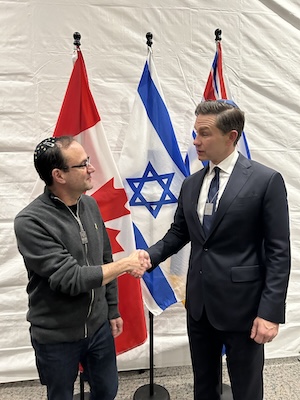
The January event was part of the JSA-Phyliss and Irving Snider Foundation Empowerment Series and was co-sponsored by the Kehila Society of Richmond, COSCO and West End Seniors’ Network.
Moss, Glick and Margot Beauchamp, JSA’s quality assurance liaison, have since met with Chant. According to Moss, Chant gave them her support to move the initiative forward by way of making an introduction to the ministers of finance and health, along with opportunities to speak with all MLAs. JSA is also seeking the support of Brennan Day, opposition critic for rural health and seniors’ health.
JSA is working to advance the interests of seniors at the national level as well. During Conservative Party of Canada head and leader of the Official Opposition Pierre Poilievre’s visit to Temple Sholom on Feb. 2, Moss said he took a moment to let Poilievre “know that 65% of BC seniors are living on less than $40,000 annually and that adjustments are needed in the Guaranteed Income Supplement for seniors so that they can ensure more sustainability to age better.”
Poilievre directed Moss to follow up with his policy team.
For more information on JSA’s home-care advocacy, visit jsalliance.org/advocacy.
Sam Margolis has written for the Globe and Mail, the National Post, UPI and MSNBC.

